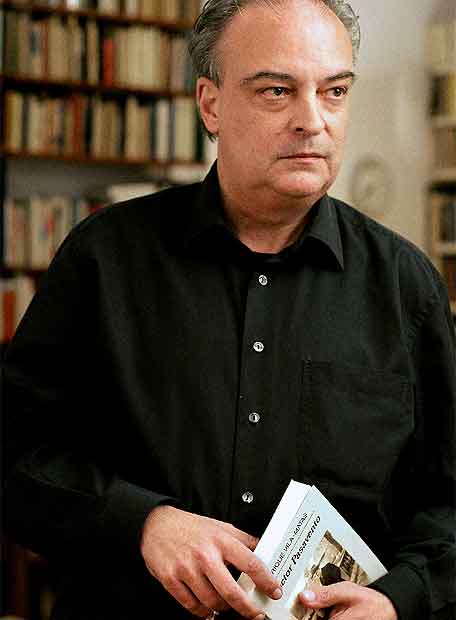So there I am, in the Norwich branch of Waterstones, experiencing that feeling that I am fairly sure most book readers feel at one time or another: “Christ, isn’t it amazing that there are so many books to read? Christ, isn’t it shit that there are so many books to read?” It is, of course, a tragic double bind, and I often feel when I am in a book shop that I am not looking for anything in particular. I either go with the very express purpose of buying a single book, or just hopelessly and hopefully wade through the shelves, reading bite-sized reviews and the occasional blurb, smiling nostalgically at covers I have already read. This is how I found Enrique Vilas-Matas’ Never Any End to Paris, a book published in 2003 and translated by Anne McLean in 2011. It was on a table of assorted books – what thematic link bringing them together escapes me now – but on its front cover read the following: “A writer who has no equal in the contemporary landscape of the Spanish novel”. This is a grandiose and alluring statement in itself (precisely the kind of statement I am prone to making on this blog), but what made it infinitely more enticing is that it was Roberto Bolaño who makes the claim. Bolaño, of course, for those who may have regularly read the blog, authored 2666, which is the best novel I have ever read. Thus, I dove in; unsure of the text’s nature, unsure of the author’s biography. I was pretty much unsure of everything about the novel.

What a delightful discovery it was, coming as it did unexpectedly and ending up as it did a brilliant, splendid and clever novel. This is a short novel, but one that makes you excited about reading, one that makes you excited to return to the text. Indeed, reading the novel, this is the emotion it evokes most viscerally: excitement. This is a really exciting piece of literature – it is intelligent, it has depth, it is enjoyably readable and, dare I use what is admittedly a really awful word, it is also really original. In its 197 pages and its 113 chapters, I was positively and perpetually excited by Never Any End to Paris, and it was also a text that made me realise I have not felt excitement for a novel in quite some time. I descended into admiring fits of genuflection when reading 2666, I was calmly and subtly charmed by Marilynne Robinson’s Gilead, I was, of course I was, stunned by The Great Gatsby’s everlasting beauty. But none of these books made me feel quite so tangibly excited; I laughed at this book, I turned the pages super quickly, yet I also tried to pause and immerse myself in every sentence.
Never Any End to Paris chronicles Vilas-Matas’ two years living in Paris between 1974 and 1976, a time of his life in which he is trying to emulate his great idol, Ernest Hemingway, and write his first novel, The Lettered Assassin. The parameters of the novel actually sets itself up as a lecture given over the course of the three days, and this is a subject of rumination for our narrator. This is a semi-autobiographical novel par excellence, and as a result it problematizes and scrutinises in great detail, with great wit and wisdom, the relationship that writing and fiction and literature has with the way we experience reality. This may even be seen as the central focus of the text: what is reality? How does storytelling change that? How do we cope with the relationship between literature and reality? In this sense it is a brilliant and ultra-accessible theoretical text as well as a novel, pausing as it does on numerous occasions to take scope of itself and assess the pitfalls and promises of writing.
I hope this does not bestow upon on the text an idea of thematic heaviness; though it is a metafictional book well aware of its own construction, this is never suffocating, and it is also a very funny text, and this is something established from the outset. Our narrator spends stubborn years fattening up to enter a Hemingway lookalike context, much to the chagrin of his wife. He even goes so far as to buy a fake beard in a final bid for authenticity. He is promptly disqualified: “they didn’t throw me out of the competition because they discovered the false beard – which they did not – but because of my ‘absolute lack of physical resemblance to Hemingway’.” This is a novel full of flashes of comedy and ironic self-awareness; the narrator is absolutely obsessed with irony and the impact it has for the way we process our existence and our writing. Dealing with a narrator like this is an immensely rewarding experience, especially for someone who writes as well as reads, because Never Any End to Paris has a remarkable propensity for making plain and vivid those problems of composition which sometimes seem so elusive.
It is a text that dares to “lay bare the challenge of the incessant futility of words” whilst also celebrating them. It takes aim at the stereotypical pretentiousness of writing whilst also revealing the act of writing to be a wonderfully inclusive experience – anyone can read this book. With swagger, humour, simultaneous restraint and expanse, Never Any End to Paris is a novel that makes one excited and thankful for the process of reading.
★★★★★